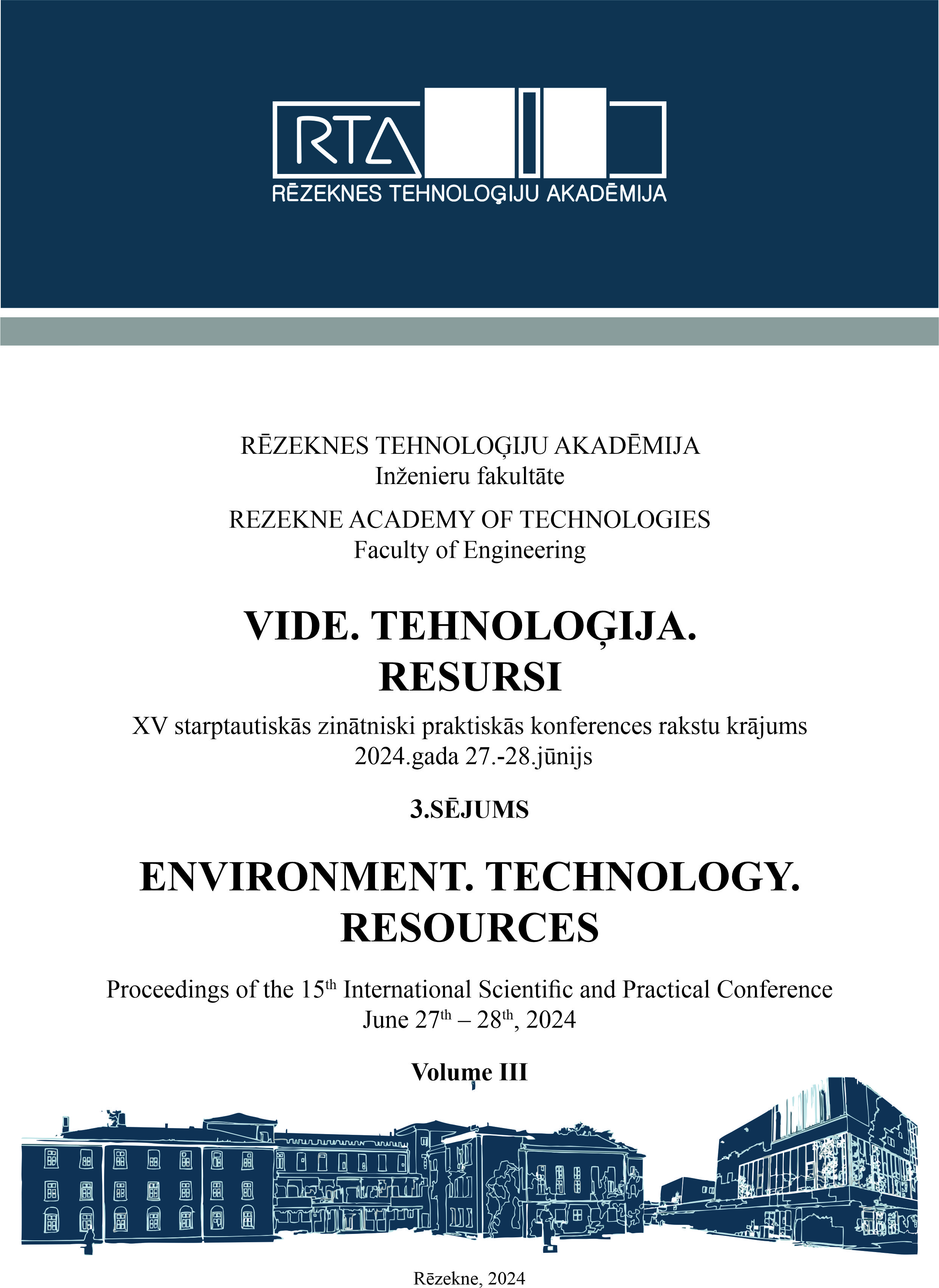INVESTIGATION FIBER LASER EFFECTS ON TITANIUM GR2: COLOR MARKING AND SURFACE ROUGHNESS
DOI:
https://doi.org/10.17770/etr2024vol3.8167Keywords:
Fiber laser, laser color marking, laser texturing, titanium Gr2Abstract
In this subsequent investigation, we expand upon our initial research by delving into the laser engraving and marking of Grade 2 Titanium (Ti Gr 2) using frequencies of 300 kHz and 700 kHz. Building upon our preliminary experiments involving 100 kHz and 500 kHz, we utilized the Rofin PowerLine F 20 Varia fiber laser to mark Grade 2 titanium within a 6x6 matrix, with each square measuring 5x5 mm. Our meticulous adjustments to the laser marking parameters — encompassing speed (100-1100 mm/s), power (8-18 W), and the introduction of new frequencies (300 kHz and 700 kHz) — allowed us to scrutinize their impact on surface roughness and contrast. Employing advanced techniques, including a laser scanning microscope and Adobe Photoshop software, our analysis unveiled explicit connections among contrast, roughness, frequency, scanning speed, and power. These findings not only extend the scope of our previous experiments but also illuminate subtleties specific to the 300 kHz and 700 kHz frequencies. The insights derived from this study furnish crucial information on the optimal laser marking parameters for Grade 2 titanium, thereby augmenting its efficacy and durability across a diverse array of applications. Moreover, this research contributes to the progressive comprehension of color variations in laser-engraved titanium Grade 2, particularly within the 300 kHz and 700 kHz frequency range.References
Romaniuk, R. S., Gajda, J. (April 2013). "Laser Technology and Applications 2012." International Journal of Electronics and Telecommunications, 59(2), 195-202.
Gao, W., Xue, Y., Li, G., Chang, C., Li, B., Hou, Z., Li, K., Wang, J. (2018). "Investigations on the Laser Color Marking of TC4." International Journal of Electronics and Optoelectronics, https://doi.org/10.1016/j.ijleo.2018.12.113
Pou, P., Riveiro, A., del Val, J., Comesaña, R., Penide, J., Arias-González, F., Soto, R., Lusquiños, F., Pou, J. (2017). Laser surface texturing of Titanium for bioengineering applications. Procedia Manufacturing, 13, 102-107. https://doi.org/10.1016/j.promfg.2017.09.102
Nath, A. (2014). Laser Drilling of Metallic and Nonmetallic Substrates. In: Laser Precision Microfabrication. DOI: 10.1016/B978-0-08-096532-1.00904-3.
Subramonian, S., Kasim, M. S., Ali, M. A. M., Anand, T. J. S., & citi. (2015). Micro Drilling of Silicon Wafer by Industrial CO2 Laser. International Journal of Mechanical and Materials Engineering, 10(1), 1-7. DOI: 10.1186/s40712-015-0029-8.
Kumar, A., & Kumar, H. (2021). Analysis of material removal of Inconel 718 cylinder using magnetic abrasive finishing process assisted with chemical etching. Materials Today: Proceedings. DOI: 10.1016/j.matpr.2021.09.304.
Hristov, V. N., Lazov, L., Petrov, N. A., Yankov, E. H. (2023). Influence of basic parameters of the laser marking process on stainless steel samples. Environment Technology Resources Proceedings of the International Scientific and Practical Conference, 3, 311-315. DOI: 10.17770/etr2023vol3.7216.
Melo-Fonseca, F., Guimarães, B., Gasik, M., Silva, F. S., & Miranda, G. (2022). Experimental analysis and predictive modelling of Ti6Al4V laser surface texturing for biomedical applications. Surface Innovations. DOI: 10.1016/j.surfin.2022.102466.
Henriksen, N. G., Poulios, K., Somers, M. A. J., & Christiansen, T. L. (2023). Impact of laser marking on microstructure and fatigue life of medical grade titanium. Materials Science and Engineering: A, 145020. DOI: 10.1016/j.msea.2023.145020.
Awasthi, A., Kumar, D., & Marla, D. (2023). Understanding the role of oxide layers on color generation and surface characteristics in nanosecond laser color marking of stainless steel. Optics and Laser Technology. DOI: 10.1016/j.optlastec.2023.110469.
Gräf, S., Kunz, C., Undisz, A., Wonneberger, R., Rettenmayr, M., & Müller, F. A. (2019). Mechano-responsive colour change of laser-induced periodic surface structures. Applied Surface Science. DOI: 10.1016/j.apsusc.2018.12.051.
Geng, Y., Li, J., & Lu, C. (2022). Experimental and numerical investigations on color stability of laser color marking. Optics and Lasers in Engineering. DOI: 10.1016/j.optlaseng.2022.107225.
Li, Z., Xu, J., Zhang, D., Xu, Z., Su, X., Jin, Y., Shan, D., Chen, Y., & Guo, B. (2022). Nanosecond pulsed laser cleaning of titanium alloy oxide films: Modeling and experiments. Journal of Manufacturing Processes. DOI: 10.1016/j.jmapro.2022.08.033.
Boyer, R.R. (1996). An overview on the use of titanium in the aerospace industry. Materials Science and Engineering: A, 213(1-2), 103-114. DOI: 10.1016/0921-5093(96)10233-1.
Monogarov, K.A., Pivkina, A.N., Grishin, L.I., Frolov, Yu. V., & Dilhan, D. (2016). Uncontrolled re-entry of satellite parts after finishing their mission in LEO: Titanium alloy degradation by thermite reaction energy. Acta Astronautica. DOI: 10.1016/j.actaastro.2016.10.031.
Arun, A., Lakshmanan, P., Parthiban, K., Kumanan, G., & Arunkumar, L. (2022). Experimental study on laser surface texturing and wear characterization of titanium alloy. Materials Today: Proceedings. DOI:10.1016/j.matpr.2022.03.621.
Morales, M., Munoz-Martin, D., Marquez, A., Lauzurica, S., & Molpeceres, C. (2018). Laser-Induced Forward Transfer Techniques and Applications. In: Advances in Laser Materials Processing, Chapter 13, 339-379. DOI: 10.1016/B978-0-08-101252-9.00013-3.
L. Lyubomir, N. Pavels un D. Hristina, «Laser Marking Methods» Technology. Resources, (2015), Volume I, 108-115, pp. 109-112., 2015.
K. McLAREN, XIII—The Development of the CIE 1976 (L* a* b*) Uniform Colour Space and Colour-difference Formula, vol. 92, Journal of the Society of Dyers and Colourists, 1976, pp. 338-341.
A. J. Arkadiusz, S. Bogusz, K. E. Paweł un A. M. Krzysztof, «The influence of process parameters on the laser-induced coloring» Applied Physics A volume 115, pages1003–1013 (2014), March 2013.
Lapa, J., Adijans, I., Yankov, E. H., Revalds, R. (2023). "Investigation of Laser Marking and Texturing of Titanium Gr 2 with Fiber Laser." Environment Technology Resources Proceedings of the International Scientific and Practical Conference, 3, 321-327. DOI: 10.17770/etr2023vol3.7251.
Downloads
Published
Issue
Section
License
Copyright (c) 2024 Jekabs Lapa, Imants Adijāns, Emil Yankov, Lyubomir Lazov, Ritvars Rēvalds

This work is licensed under a Creative Commons Attribution 4.0 International License.



